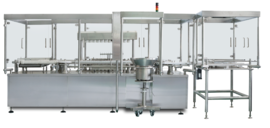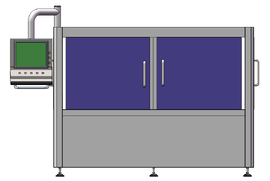Revolutionizing Pharmaceutical Quality Control: A Deep Dive into Intelligent Inspection and Leak Detection Technologies
PHARMACEUTICAL MACHINERY
4/30/20254 min read


Introduction: The Critical Role of Inspection in Modern Pharma
In the pharmaceutical world, precision isn't a luxury—it's a necessity. Every ampoule, vial, and infusion bag must be thoroughly inspected to ensure patient safety and regulatory compliance. In recent years, automation and intelligent inspection systems have transformed quality control across the industry. Whether it's foreign body detection or microporous leak testing, modern machinery offers consistent accuracy, faster production speeds, and comprehensive data reporting.
Why Precision Matters: The Risks of Undetected Foreign Bodies and Leaks
Foreign bodies and micro-leaks can introduce contaminants, leading to health hazards, product recalls, and legal liabilities. In the past, manual inspections were the standard, but human error often meant defective products went unnoticed. Today's advanced machines provide the precision and consistency needed to meet global GMP (Good Manufacturing Practice) standards.
Automatic Foreign Body Inspection Machine for Ampoule Injection
These machines are designed to inspect ampoules filled with injectable solutions. Using high-speed cameras and artificial intelligence, they detect particulates suspended in liquid and irregularities in glass. Their ability to operate continuously makes them a critical component of any high-volume pharmaceutical manufacturing line.
Foreign Body Inspection in Oral Liquid Production: Automation in Action
Oral liquid medications require similar precision as injectable drugs. Automatic foreign body inspection machines for oral liquid solutions utilize rotating mechanisms, image analysis, and infrared detection to identify contaminants. The technology supports multiple container types, including glass and plastic.
Advanced Inspection for Vial Freeze-Dried Agents: Ensuring Sterility
Freeze-dried agents (lyophilized drugs) in vials must be sterile and particulate-free. These inspection systems not only scan for foreign bodies but also check the freeze-drying cake structure. Cracks, discoloration, or unexpected textures can indicate compromised integrity.
How Large-Volume Plastic Bottle Infusions Are Made Safer with Automation
Infusions packaged in large plastic bottles pose unique challenges. Automatic inspection machines for this category are equipped with 360-degree cameras, vibration detectors, and light diffusers. They ensure that every unit is free of particulate matter and sealed correctly.
Inside the Technology: Electronic Microporous Leak Detection for Ampoules
Microporous leaks are microscopic holes that can compromise drug sterility. Electronic microporous leak detectors apply vacuum and pressure techniques to detect even the smallest breaches. For ampoule injections, this is a game-changing technology that enhances both safety and product life span.
Electronic Leak Detection in Infusions: Going Beyond the Surface
For large-volume infusions, standard leak detection isn’t enough. Infusion automatic electronic micro-hole leak detectors use high-frequency conductivity and electronic differentials to identify minute holes that escape the human eye.
Soft Bag Packaging and the Challenge of Micro-Hole Detection
Soft bags are increasingly used due to their flexibility and cost-efficiency. However, they are more susceptible to punctures. Automatic electronic microporous leak detectors for soft bags employ vacuum decay methods, laser scanning, and acoustic resonance for ultra-sensitive inspection.
The Ampoule Sealing Quality Inspection Machine: Accuracy Meets Efficiency
An improperly sealed ampoule can allow microbial entry. Sealing quality inspection machines use high-speed thermal imaging and pressure tests to verify the integrity of the ampoule seal. Real-time rejection mechanisms ensure faulty units are immediately removed.
Vacuum Inspection for Vials: The Invisible Threats You Can’t Ignore
Vacuum inspection machines for vials measure internal pressure changes to detect leaks. These systems can identify sealing issues, hairline cracks, or manufacturing flaws that could compromise drug efficacy.
Glass Bottle Infusion: Specialized Foreign Body Detection Explained
Infusions in glass bottles require careful inspection due to the risk of glass particle contamination. Machines designed for this task incorporate multiple camera angles, ultraviolet light inspection, and AI-enhanced decision making to ensure maximum accuracy.
The Rise of Plastic Ampoules: New Detection Challenges and Solutions
Plastic ampoules are more economical and less fragile, but detecting leaks or particles inside them is more complex. Electronic microporous leak detectors for plastic ampoules are specially calibrated to handle these challenges, using ultrasonic and dielectric analysis.
Video Column Integration: Visual Assurance in Every Batch
Video columns allow operators to manually verify flagged anomalies. Integrated with inspection systems, they provide real-time footage of defects and assist in operator training and auditing. Video documentation is also invaluable for regulatory compliance.
Ampoule Washing, Drying, Filling, and Sealing: The Power of Line Integration
Linkage units that combine ampoule washing, drying, filling, and sealing streamline the production process. These units reduce handling errors and increase throughput. Synchronization with inspection machinery ensures a seamless, fully controlled production environment.
Understanding the ZJL Vacuum Attenuation Leak Detector
The ZJL Vacuum Attenuation Leak Detector uses pressure decay methods to assess container integrity. It measures vacuum loss over time to identify even microscopic leaks. This technology is suitable for multiple container types, including ampoules, vials, and soft bags.
Benefits of Automating Inspection and Leak Detection
Automation improves accuracy, reduces human error, and increases production speed. It also ensures compliance with stringent pharmaceutical regulations. Data from automated systems can be logged and audited, providing a transparent quality control history.
Use Cases from Leading Pharma Plants Around the World
Top pharmaceutical manufacturers have integrated these technologies to optimize their operations. Case studies from facilities in Germany, Japan, and the United States show improved batch consistency, fewer recalls, and enhanced consumer confidence.
What to Look for When Choosing an Inspection Machine
Key considerations include container compatibility, detection sensitivity, throughput speed, and integration capabilities. Look for machines with AI-based decision-making, data logging, and real-time rejection systems for optimal performance.
Conclusion: Future Trends in Pharmaceutical Quality Control
As pharmaceutical manufacturing continues to evolve, the role of intelligent inspection and leak detection systems will only grow. Innovations such as AI-driven diagnostics, cloud-based analytics, and blockchain-integrated traceability are on the horizon. By adopting these advanced technologies now, manufacturers not only safeguard patient health but also gain a competitive edge in a rapidly advancing industry.


